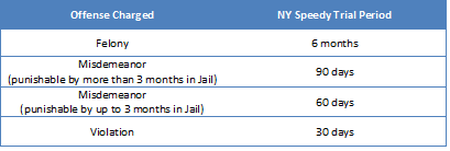In New York State, the legislature has established time limitations before which the prosecution must be ready for trial. Under NY CPLR § 30.30, a motion to dismiss on speedy trial grounds must be granted if the prosecution is not ready within the designated amount of time, subject to certain enumerated exclusions. The statute sets forth the following speedy trial periods which begin running at the commencement of the criminal action:
In New Jersey, the determination as to whether an accused’s right to a speedy trial has been violated has been established by common law and is based on an evaluation of several factors. In practice, an accused has a much more difficult time asserting his speedy trial rights in New Jersey.
(1) The length of the delay;
(2) The reasons for the delay;
(3) Defendant's assertion of his right to speedy trial; and
(4) Any prejudice to defendant caused by the delay.[i]
It is important to note that an accused need not show prejudice if the first three factors weigh heavily in his or her favor.[ii] Additionally, an accused can demonstrate prejudice beyond the showing of diminished ability to defend against the charges. Prejudice includes employment interruptions, public criticism, anxieties due to ongoing prosecution, the drain on finances, etc.[iii]
In both New York and New Jersey, the determination of speedy trial time includes numerous exceptions to the rule, and each case should be reviewed by a Criminal Defense Attorney in order to determine whether one’s right to a speedy trial has been violated.
Contact us today and schedule a free consultation to discuss how we can protect your right to a speedy trial.
[i] State v. Gallegan, 117 N.J. 345, 354-355 (N.J. 1989).
[ii] State v. Farrell, 320 N.J. Super. 425, 446 (App.Div. 1999)
[iii] Id.

 RSS Feed
RSS Feed
